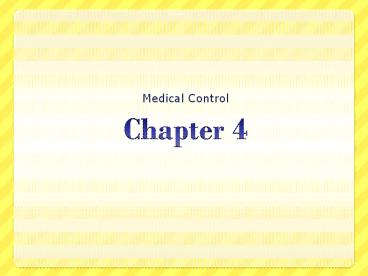Ch.4 - Chriss, Social Control - PowerPoint PPT Presentation
Title:
Ch.4 - Chriss, Social Control
Description:
Ch.4 from James J. Chriss, Social Control: An Introduction, 2nd ed. (Polity, 2013) – PowerPoint PPT presentation
Number of Views:177
Title: Ch.4 - Chriss, Social Control
1
Chapter 4
- Medical Control
2
Introduction
- Louisiana, 1851
- Drapetomania
- Early example of medicalization
- Medical social control application of medical
understandings and terminology to secure
adherence to social norms - Transitions
- Deviance as ignorance or vice (ancient Greece)
- Deviance as sin (Middle Ages onward)
- Deviance as badness (1600 to 1800s)
- Deviance as illness (mid-1800s, esp. with rise of
psychiatry by late 1800s)
3
Parsons Sick Role
- Illness can be considered a form of deviance
- But instead of punishment, best response is
treatment - Must excuse sick person (temporarily) from
fulfilling role expectations (adaptation) - Institutionalization of appropriate responses to
sickness medical professionals (integration) - Agreement that illness is undesirable (latent
pattern maintenance) - Responsibility to seek professional help (goal
attainment)
4
Medicine and Social Control
- Irving Zolas early statement in 1972 (p. 86)
- Making medicine and the labels healthy and ill
relevant to more areas of human existence - Medicalization redefining more and more social
problems as medical problems - States are concerned with the health and wellness
of the citizenry - Individual level normal medicine (body) and
psychiatry (mind) - Group level public health
5
Definition of Mental Disorder
- Has always been hard to define
- New definition for DSM-V (p. 87)
- Occurs in an in individual
- Clinically significant distress or disability
- Not a reaction to common stressors or losses
- Reflects an underlying psychobiological
dysfunction - But not a result of deviance or conflicts with
society - No single definition can cover all possible cases
- New additions to DSM should weigh benefits of
recognition versus harm from labeling
6
Medicine and Social Control
- Public Health the art and the science of
preventing disease, prolonging life, and
promoting health - Can lead to hygienization or even public
healthification - Governments obsessed with the health and
well-being of citizens - Biggest bang for the buck
- Utilitarianism, public safety are overriding
concerns - Even psychiatry moving more to the group level
(e.g., relational disorders)
7
More Terms
- Medicalization redefining more problems as
medical problems - But not a unilinear development, and not
necessarily pushed by the medical establishment
(e.g., doctors) - Demedicalization earlier medical expertise and
intervention in certain areas no longer apply - The case of homosexuality
- Remedicalization finding new ways to medicalize
a condition (e.g., through genetics, cognitive
science, etc.)
8
More Terms
- Biomedicalization tied to advances in medical
technology - Renders less relevant the human element in
medical care and treatment - Elevates to prominence the use of pharmacological
interventions - More social issues or maladies for which you can
get a prescription drug - Tied also to rise of managed care and reliance on
primary care physicians rather than specialists - Drug companies and disease mongering
- More persons willingly identifying themselves as
patients, seeking drug treatment - General process of pharmaceuticalization
9
Therapeutic Ethos
- A cultural orientation in which the self is the
new sacred object - Must pay homage to feelings and emotions
- Must engage in public confessionals when caught
in deviance - Testifying to the greatness of medical
intervention
10
Therapeutic State
- Ascendancy of the medical model of disease as the
prevailing ideology of the modern welfare state
(p. 97) - Indicators
- Therapeutic Jurisprudence
- Victims rights
- Medicalization of welfare
- Post-traumatic stress disorder (PTSD)
11
Gender and Medicalization
- Impact of medicalization as it relates to
sex/gender has passed through three phases - Gender neutrality
- Women as victims explicit attention to
medicalization of female issues - Revival of reductionism explicit attention to
male health issues
12
Dark Side of Medicalization
- Dislocation of responsibility
- Culture of victimization
- Type II Error problem judging a well person to
be sick - Domination of expert control
- Exclusion of evil deviance has worldly causes
which medicine can ascertain































